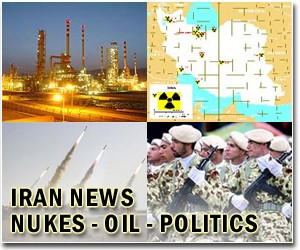 |
The United States is concerned about Iran's bridge-building with Latin American regimes as the confrontation with Tehran over its nuclear ambitions gets sharper. Washington's focus is primarily on Venezuela and Brazil at the moment; especially Brazil, which is emerging as a new energy power. Brazilian President Luiz Inacio Lula da Silva, a center-leftist, seeks to transform Brazil into a diplomatic heavyweight on the world stage.
Since Iran's firebrand President Mahmoud Ahmadinejad was first elected in 2005, he has opened embassies in six Latin American states: Nicaragua, Colombia, Bolivia, Chile, Ecuador and Uruguay. All told, Iran has 11 embassies in the region.
This westward expansion, says Norman Bailey of the Institute of World Politics in Washington, is "designed to facilitate the funding of terrorist organizations" and will jeopardize U.S. security.
Experts from the Council of the Americas told a joint U.S. congressional subcommittee in October that Iran has substantially increased its diplomatic, trade and military ties to Latin American states.
That, they said, posed a new challenge to U.S. authority in the Western Hemisphere and blunted the impact of existing U.N. sanctions imposed on Iran and those now being contemplated.
Lula is intensifying Brazil's relationship with Iran at a time when the Islamic Republic faces stiff economic sanctions over its refusal to abandon its alleged quest for nuclear weapons.
On March 4, he rebuffed a U.S. plea to back sanctions against Iran, setting the stage for a bruising battle in the U.N. Security Council.
Brazil is currently on the council as a non-permanent rotating member but it is using its foreign policy credentials to push for a permanent seat.
U.N. sanctions require the support of at least nine of the 15 Security Council members. Lula is to visit Tehran in May, the first Brazilian president to do so.
Lula has angered Washington by forging ties with Tehran and his open defense of its stated objective of developing nuclear energy for peaceful purposes.
Analyst Pepe Escobar of Asia Times Online said Lula's support for Iran at such a critical time is "one more instance of the BRICs (Brazil, Russia, India, China) acting as a new rival superpower to an increasingly disoriented 'full spectrum dominance' (United States)
"None of the BRICs is in favor of the isolation of, not to mention an attack on, Iran."
The U.S. global security consultancy Stratfor noted: "While most of the Iran-Brazil relationship consists of diplomatic theater, there are two areas of potential cooperation that could be game-changers for the United States: banking and nuclear energy.
"Iran is facing escalating sanctions pressure over its nuclear program. One of the many ways Iran has tried to circumvent this threat is by setting up money-laundering operations abroad to keep Iranian assets safe and trade flowing."
In Venezuela, where Ahmadinejad got a rapturous hero's welcome from President Hugo Chavez during a November visit, and in Panama, Iran has been setting up banking links. These consist in the main of ties between local banks and Banco Internacional de Desarrollo CA, a subsidiary of the Export Development Bank of Iran "to give Iran indirect access to the U.S. financial system," Stratfor said.
EDBI has already been blacklisted by the U.S. Treasury for involvement in Iran's alleged nuclear weapons program and the Revolutionary Guards Corps, which that runs the program.
Chavez is considered far more anti-American than Lula but Iran has sought to establish similar banking links in Brazil.
When Ahmadinejad visited Brazil in July 2009, EDBI and Brazilian banking chiefs drafted a memorandum of understanding that supposedly was intended to facilitate trade.
However, Stratfor cautions, that's likely to involve "the establishment of Iranian banks in Brazil to evade the U.S. sanctions dragnet.
"Brazil already is believed to direct most of its trade with Iran through the United Arab Emirates to avoid attracting negative attention. But Iranian banks on Brazilian soil would not be easy to hide and would not be ignored by the United States."
In the nuclear sector, U.S. officials suspect Lula plans to discuss a possible nuclear deal with Iran when he visits Tehran.
The details of this remain unclear but Brazil announced in early 2009 that it had embarked on enriching uranium on an industrial scale in its drive for nuclear self-sufficiency. That could make it a possible supplier of nuclear fuel to Iran.








No comments:
Post a Comment